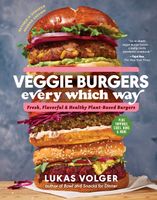Advertisement
Introduction
Appears in
By Lukas Volger
Published 2021

Why bother making veggie burgers when it’s so easy to buy them in boxes?
A veggie burger is no mere approximation of a hamburger. Aside from their shared circular shapes, the two have very little in common. So why is it that veggie burgers are so often used as boring stand-ins for hamburgers? And why do we call them “burgers” in the first place? It seems that veggie burgers have been unfairly represented, and it’s about time to champion them as their own independent category of food.
Over the past few decades, packaged and frozen veggie burgers have developed a loyal following among vegetarians and vegans, and I’m frequently baffled as to how this happened. I’m a longtime veggie burger enthusiast, but I’ve never been a fan of those. I don’t like the rubbery texture, and I don’t like all the salt and the often-cryptic ingredients—can someone tell me what modified vegetable gum is, or autolyzed yeast extract? Can I buy either of them at the grocery store? Most of all, I don’t like that processed flavor, present even in the ones that claim to be made only from identifiable ingredients; I find it to be suggestive of fast-food joints and stinky microwaves. It seems that most people settle for these as a quick fix: as a snack, an easy dinner, or something to pop in the microwave on your lunch break. When I talked to vegetarians and vegans as I was working on this book, even accomplished cooks admitted that it had never occurred to them to make veggie burgers themselves—despite eating them for years. Many, however, told me of their favorite store-bought brands and the restaurants that serve the best renditions. Now, I’ve long known that veggie burgers have a central role in the diets of vegetarians and vegans (and many omnivores as well), but I didn’t realize how limited our collective curiosity appears to be when it comes to this particular staple.

